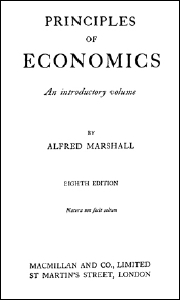
Alfred Marshall (1842-1924) produced an economics textbook, Principles of Economics, that in many ways would be recognizable to students of mainstream microeconomics today. He was immensely influential, partly because of his prolific writing, but also because of his creation of a strong legacy. In 1888, Herbert Foxwell wrote, “Half the economic chairs in the United Kingdom are occupied by [Marshall’s] pupils, and the share taken by them in general economic instruction in England is even larger than this.” (Ekelund and Hebert, A History of Economic Theory and Method, 5th ed., p. 345).
Though Marshall was a mathematician before he became an economist, and used mathematics in economics (early in life he translated Ricardo and Mill into mathematics), he recognized that mathematics had its limits. In 1906, he wrote to a friend, Arthur Bowley:
Continue reading “Marshall, Menger, and Method”I had a growing feeling in the later years of my work at the subject that a good mathematical theorem dealing with economic hypotheses was very unlikely to be good economics: and I went more and more on the rules–(1) Use mathematics as a shorthand language, rather than as an engine of inquiry. (2) Keep to them till you have done. (3) Translate into English. (4) Then illustrate by examples that are important in real life. (5) Burn the mathematics. (6) If you can’t succeed in 4, burn 3. This last I did often.
Alfred Marshall, quoted in Ekelund and Hebert, 5th ed., p. 346.
